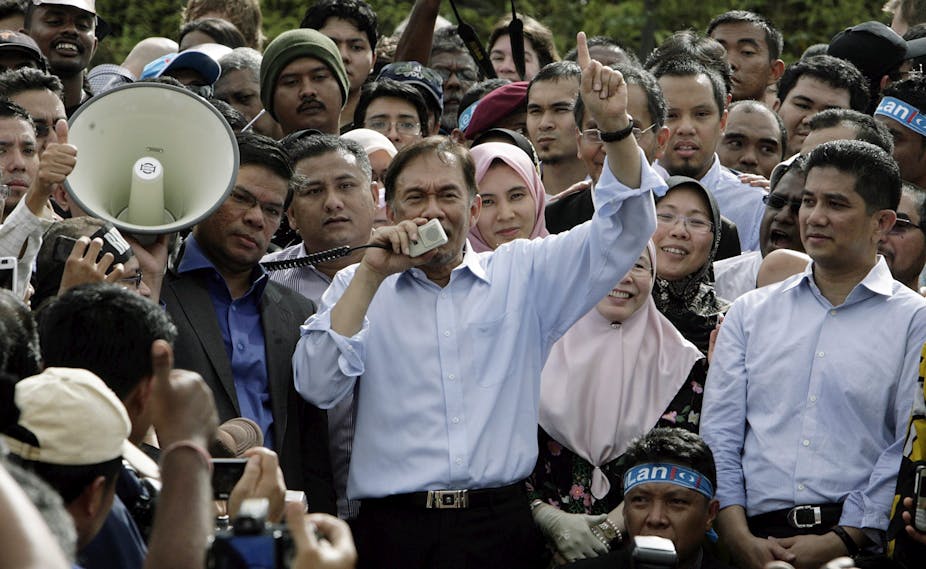Malaysia’s general elections on Sunday (GE13) will be a battle of the coalitions, pitting the world’s most successful ruling coalition – the 13 party Barisan Nasional (BN/National Front) - against the four year old, three party Pakatan Rakyat (PR/People’s Alliance).
Recent polls suggest a close race, but polling in Malaysia remains unsophisticated and inaccurate. There are also significant unknown variables, such as more than 2.6 million people voting for the first time and the extent to which electoral irregularities will affect the outcome of the election.
Given there is no reliable poll data to base predictions on, the best bet is that BN will win the majority of seats but lose the popular vote. Polling has focused on leaders, specific constituencies or exit poling for overseas voters (largely pro-PR), none of which can act as a good prediction of the outcome.
Therefore, there remains much that needs to be understood about the Malaysian political landscape before polling day.
The legitimacy of the coalition leaders - current prime minister Najib Razak and opposition leader Anwar Ibrahim – is often the focus of analysis and polls. This misses the realities of Malaysia’s complex and diverse electorate, and its biased electoral system, which makes coalition politics central to winning an election.
Ultimately, it will be the ability of either coalition to aggregate support from a disparate electorate in Malaysia’s gerrymandered and malapportioned constituencies in the peninsular and the two states of Sabah and Sarawak on the island of Borneo.
What is popular support in Malaysia?
Malaysia provides a complicated picture of popular support. The democratic “one vote one value” principle does not hold true in Malaysia. There, the value of one rural vote is equivalent to six urban votes on average. This practise favours the ruling coalition, the BN, which has been traditionally stronger in rural areas.
More interestingly, in the 2008 general elections, the BN won 112 out of the smallest 139 federal seats (out of a total of 222 parliamentary seats), giving it a simple majority in parliament with just 18.9% of the popular vote.
This practise of malapportionment (unequally-sized constituencies) and gerrymandering (the manipulation of electoral boundaries) allowed the BN to win 62 of the smallest federal seats with just 6.2% of the popular vote in 2008.
The two coalitions
The nature of Malaysia’s disparate electorate and biased electoral system makes coalitions central to winning elections. The BN’s 13 party coalition is made up of the ethno-nationalists United Malays National Organisation (UMNO) which is strong throughout peninsular Malaysia and Sabah. UMNO’s strategy since the last election has been to shore up its base support on the peninsula.
While it may succeed in doing this, it will have to come at the expense of its other coalition members on the peninsula. These parties represent Chinese and Indian minorities on the peninsula. As a result the Malaysian Chinese Association (MCA), the Malaysian Indian Congress (MIC), the People’s Movement Party (GERAKAN) and the People’s Progressive Party (PPP) are likely to be wiped out at GE13.

Najib Razak has reached out through populist measures - increasing cash handouts to the poor and renewing his approach to education policy. But he is unlikely to make any headway either with the urban voters on the west coast, or the staunch Islamists in the Malay heartlands.
PR is on the offensive. By targeting mixed constituencies in previously BN safe seats, and knowing that the minority parties in BN have lost their credibility, they are relying on the popularity of the prime minister and the Malay votes to retain their federal seats.
Key battleground areas
This makes Sabah and Sarawak the key battlegrounds.
Here, the BN is on better footing, with Sarawak more certain than Sabah. At GE12, the BN won 30 out of the 31 federal seats in Sarawak and 24 out of the 25 seats in Sabah. In Sarawak, despite widespread poverty in a resource rich state and corruption by possibly the world’s longest serving chief minister of a state (1981 – present), the incumbent appears untouchable.
At the recent state elections (2011), Sarawak chief minister Abdul Taib Mahmud and the BN coalition achieved an impressive victory garnering 55 out of the total 71 seats, despite the opposition having its best results in 24 years, winning 15 seats. Nevertheless, Taib and his coalition in Sarawak remain strong with deep pockets and popular support from the public.
Meanwhile, Sabah also suffers from widespread poverty, corruption and community dissatisfaction, due to a large influx of migrants from the Philippines and Indonesia (estimated at 30% of the state population).
Locals have blamed the federal government for the influx of foreigners and accused it of attempting to dilute the power of the local Christian Kadazan-Dusuns ethnic group. However, the local BN affiliates and their broad based coalition that incorporates many local ethnic groups remain strong.
Voters in Sabah and Sarawak have long rejected politicians from the peninsula and even Anwar Ibrahim’s political skills have not been very effective in forging a successful coalition with local elites. The opposition leader has relied on former BN leaders, who have defected to spearhead its challenge, while the Malaysian Islamist party (PAS) does not have any significant support.
The geographical terrain of Sabah and Sarawak with its diverse ethnic groups, low levels of economic development, resource driven economy and the general mistrust of peninsular politicians make it a tough challenge for the PR.
Despite having only 16% of the total electorate, Sabah and Sarawak has 25% of the parliamentary seats, making it a valuable prize in the crown of the next government of Malaysia.
If PR does not get its coalition right in these two crucial states on the island of Borneo, all its valiant efforts on the peninsula are likely to come to naught at GE13.

